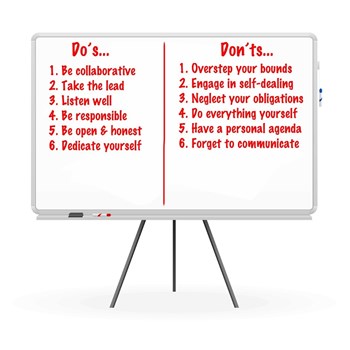
It only takes a few minutes of a web search to uncover the traits that make a successful person or business owner. For example, Entrepreneur magazine’s Steven Key wrote the article, “5 Qualities of Successful Persons,” which included such traits as open-mindedness, unwavering passion, and a forward-looking approach. But what makes a building board or association, which is made up of individuals volunteering their time, a successful one?
Be Collaborative
Helen Keller once said, “Alone we can do so little; together we can do so much.”
The definition of collaboration is the act of working with another or others on a joint project. “Members of an effective and successful board are all on the same page,” says Dale Young, director of portfolio management at FirstService Residential, one of the largest property management companies in the country. “They are seeking improvements and infrastructure that is in the best interest of the community. In a successful board there are no personal agendas. The board should be serving in the best interest of the association as a whole.”
Listen Well
“Most people do not listen with the intent to understand; they listen with the intent to reply.” ―Stephen R. Covey, The 7 Habits of Highly Effective People: Powerful Lessons in Personal Change.
When you ask attorneys who might make the best board member, a lot of answers are not surprising: former accountants, business executives, engineers. “I loved when a board's involved, but not to the point of micromanagement. They're paying a management company to manage,” says Jaime Fraser, Esq., an attorney at McGovern Legal Services, which is based in New Jersey but serves the New York area. “When a board's not involved at all, then it's hard for the manager to get the numbers for votes to make decisions, and it becomes hard to handle. Great board members are members that are active, and care and are in it for the right reasons. They respond promptly to emails from management and attorneys when things need to be addressed. There's so many issues they have to deal with.” says Fraser.
Be Responsible
Actor and professional wrestler Dwayne “The Rock” Johnson had it right when he said, “Know your role.”
All board members should know their role and what’s expected of them. The simplest way is understanding the whole concept of the fiduciary responsibility of the board to the entire building. In a nutshell, the board is a governing body that makes decisions that aren’t going to be popular, but they are responsible for the entire well-being of the building and the unit owners who reside there.
Whatever experience board members come with, they certainly cannot act simply on behalf of themselves. “I would rather the managing agent do most of the interaction with unit owners because board members are unit owner’s neighbors and friends. The management company should be the face of the board,” says David J. Byrne, a partner at the law firm of Herrick, Feinstein LLP, which has offices in New York City and New Jersey.
A major sign of maturity among board members pertains to that they don’t talk unless they absolutely need to. “The ideal board member is someone who doesn't like to hear themselves talk. You want people who don't act like children, which you find a lot of,” says Byrne.
Be More Forward-Thinking
Life is what happens to you while you're busy making other plans.”—Allen Saunders.
Allen Saunders’ quote might sound like a new-age way of thinking, but the reality is that while you’re planning for today, tomorrow is coming fast, so it’s important to have a board that thinks about the ‘what-ifs,’ even when nobody wants to. As a matter of fact, thinking about tomorrow is one of the most important things a board can do for the success of their property.
Successful boards are also those who look, not just at today’s issues, but at tomorrow as well.
Dedicate Yourself
“We all have dreams. But in order to make dreams come into reality, it takes an awful lot of determination, dedication, self-discipline, and effort.”—Jesse Owens
The most successful ones have members who stay on the board for more than just a year or two. Property managers and attorneys have found that the most important aspect of a successful board is that they don’t change every year. That said, no changeover at all can be detrimental as well. If there’s no change in leadership, transparency tends to fade away, and few new ideas are brought to the table.
Learn to Communicate
“The single biggest problem in communication is the illusion that it has taken place,” says George Bernard Shaw.
Aside from using the resources and professionals given to you, the most important trait for a board member is to be open and transparent to fellow shareholders and unit owners. A very common complaint amongst them is a lack of communication from the board. Sometimes that's the fault of the residents themselves, who may not be looking out for information that the board provides them regularly. In general, the best thing boards can do is to communicate as much as they can via email, or a website. The more transparency owners and shareholders feel about their community management, the better.
As with any institution, politics do play a role in co-op and condo boards and buildings, and while unnecessary posturing is usually a big mistake, smart boards utilize their professional help to make sure shareholders and unit owners don’t have aggressive knee-jerk reactions to regrettable news. “They should be communicating with unit owners at meetings, in a formal setting and with records being kept. But, the property manager should be the one that speaks to the members, giving bad news, any information the condo needs, and then the property manager should report back to the board,” says Byrne.
The best boards certainly have the ability to work together and listen. Condos and co-ops are not much different from any other group of people living next to each other. “The best boards get along. Unfortunately sometimes boards can get divisive, or have two opposing viewpoints. There's so much politics behind it. A condo board is like a mini-version of a town government. There's so much going on behind the scenes, and sometimes good decisions tend to suffer when boards don't get along,” says Fraser.
Be Respectful of Other Opinions
The famed comedian Rodney Dangerfield made it his mantra that he gets no respect, but the last thing you want is for board members and unit owners to feel that way.
Since board members are effectively leaders of their communities, listening to the community, members of the association is vital. Co-op and condo board members are privy to a lot of information that shareholders and unit owners aren't, and with help from managers and lawyers, they have to know what to say when, what not to say, and when to let the professionals handle the responsibility.
Leaders are always subject to criticism, and for that board members will always have to have thick skins. One of their important roles is to bring everyone together, and you're going to have outliers. Board members have to be able to take an unpleasant assessment, and explain to everyone that's necessary and the association needs it. Moreover, they have to leave their personal agendas at home.
Board members should open up to what the community needs, and check their egos at the door, all the while getting little in return. “There's never any gratitude. They give up so much time and energy trying to do what's best for the community. Sometimes people who come to board meetings are the people who come to complain and create problems. So, it's a very ungrateful job. You have respect the time they put in, and it's very trying on their patience, but you need to have the patience to respond to unit owners respectfully,” says Fraser.
Be Open and Honest
“It is better to offer no excuse than a bad one,” ―George Washington.
A good rule of thumb is to simply share as much information as possible with the owners. An open board is perceived as an honest and fair board, especially when it comes to financials and contracts. The more you can do to inform the shareholders and unit owners the better. If you’re providing the information, and they know it’s accessible, they have a sense of security. When board members don't share the information, angry unit owners or shareholders will use it against board members. The more you stonewall shareholders and unit owners when they ask questions or ask for information, people will assume that you’re hiding something. It's a good policy to provide more information than the owners expect.
Watch Carefully
On the flip side, some boards struggle and succumb to pitfalls. “Political in-fighting can cause a board to be completely ineffective,” says Young. “You will never accomplish association business when members are fighting each other instead of figuring out how to work with each other. Respect one another’s opinions, even if from another vantage.”
By studying and implementing these traits, the board has a greater chance of success and longevity, without serious problems.
Lisa Iannucci is a freelance writer and a frequent contributor to The Cooperator. Editorial Assistant Tom Lisi contributed to this article.






Leave a Comment